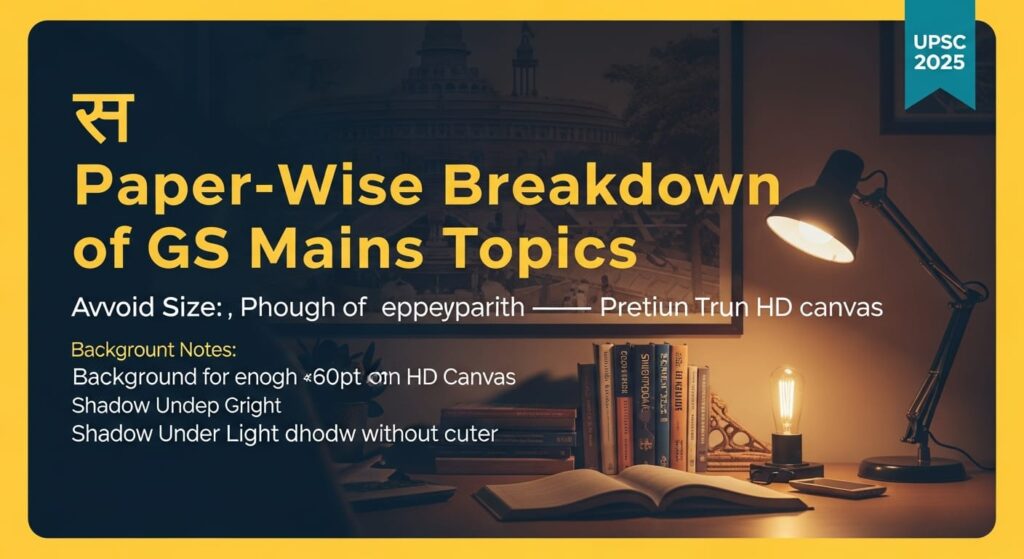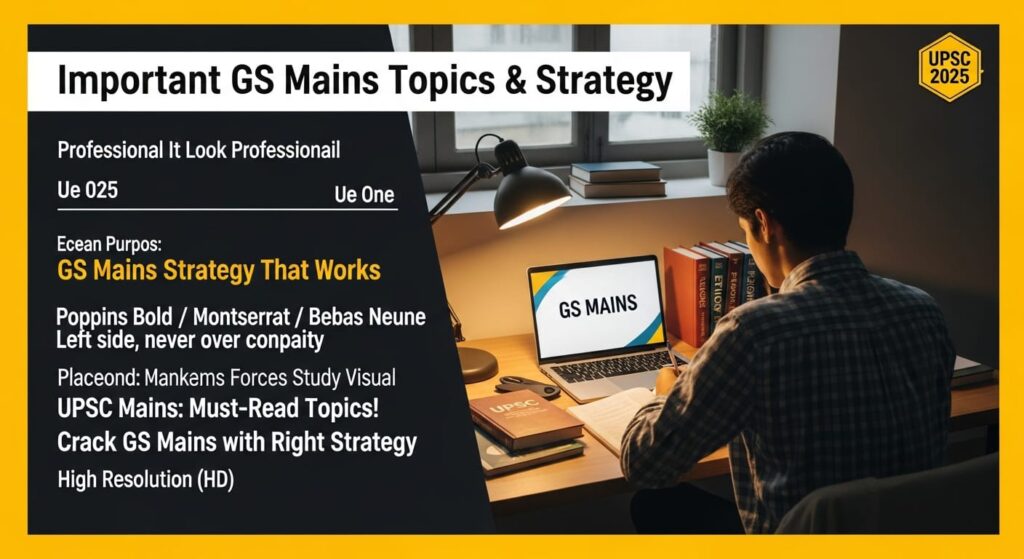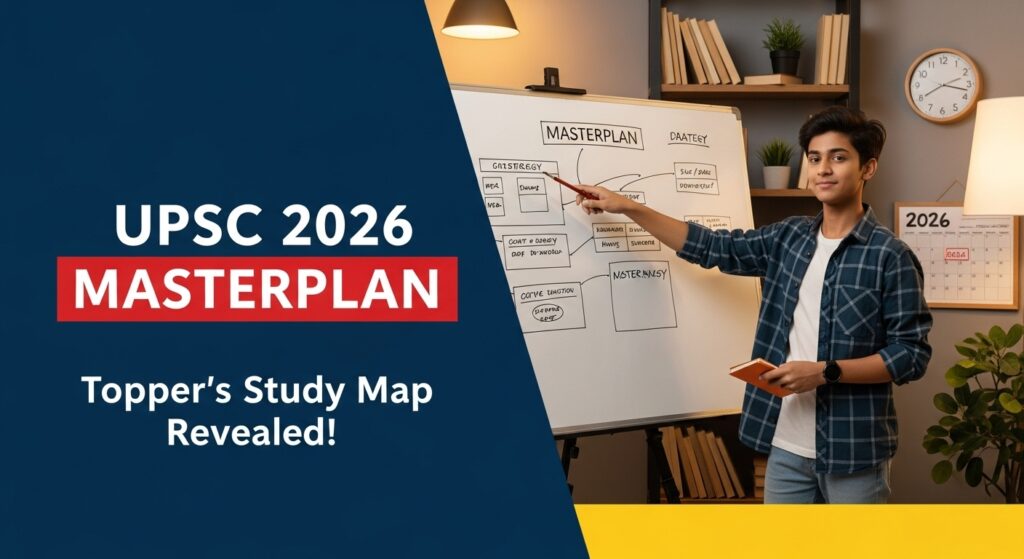I remember when I first sat down to prepare for GS Mains — it felt like I was staring at a mountain with no map. Everyone was saying “study smart”, “follow strategy”, but no one was telling exactly what topics to focus on, or how to go about it without burning out.
That’s why I’ve written this post. I’m not going to dump the entire syllabus on you. Instead, I’ll break down the important GS Mains topics & strategy that actually matter — the stuff that repeats, the kind of questions UPSC loves, and how you can approach each paper without losing your mind.
If you’re serious about this exam, this might save you a lot of time and confusion.
And yes, if you’re looking for crisp, relevant PDF notes and updates, I share everything free on my Telegram channel: https://t.me/iasprepin
Why You Can’t Take GS Mains Lightly
Many aspirants make the mistake of thinking, “I’ll focus on GS after Prelims.” But the truth is, you don’t get enough time after Prelims. And worse, if your GS score is average, it can easily pull down your final rank.
So the earlier you start building your GS base, the better your chances of finishing strong.

🧠 Important GS Mains Topics & Strategy – Paper-wise Breakdown
important GS Mains topics & strategy : Let’s break this down into what really matters – paper by paper, topic by topic.
📘 GS Paper I – Important GS Mains Topics to Prioritize – History, Society, Geography
This paper is a mix of static and semi-dynamic content. PYQs are your best guide here.
History (Modern India is key)
Revolt of 1857, socio-religious reform movements
Freedom movement – phases, personalities, events
Art & culture – temples, architecture, paintings, classical dances (revise this regularly)
Society
Role of women, issues of patriarchy
Globalization & its effect on Indian society
Communalism, regionalism, secularism
Geography
Monsoons and Indian climate
Natural disasters, earthquake zones
Mapping of important rivers, resources, industries
📗 GS Paper II – Strategy & Important GS Mains Topics Combined, Governance, International Relations
Polity
President, Governor, Parliament powers
Role of constitutional bodies – EC, CAG, UPSC
Supreme Court judgments and their impact
Governance
Welfare schemes – PMJAY, PM-KISAN, etc.
NGOs, SHGs, e-governance
Citizen charters, RTI, accountability issues
IR (Dynamic, Current Affairs Based)
India and its neighbours – China, Pakistan, Nepal
India’s foreign policy shifts, QUAD, Indo-Pacific
Diaspora, global groupings, international summits
📈 GS Paper III – Smart Coverage of Important GS Mains Topics, Tech, Environment, Security
Economy
Budgeting process, FRBM, taxation
Agriculture reforms, MSP issues
Inclusive growth, infrastructure, Make in India
Environment
Climate protocols – Paris, Glasgow
EIA, biodiversity, environmental laws
Renewable energy initiatives (solar, hydrogen)
Science & Tech
Space missions – Gaganyaan, Aditya L1
AI, blockchain, drones, cybersecurity
Internal Security
Terror financing, cyber threats
Border management
Role of agencies like NIA, NSG
📕 GS Paper IV – Ethics, Integrity, Aptitude
important GS Mains topics & strategy : This paper is unique. No current affairs, no standard books. It tests YOU — your values, clarity, and decision-making.
Important areas:
Attitude, emotional intelligence
Thinkers: Gandhi, Kautilya, Kant, Rawls
Case studies on dilemmas, corruption, transparency
🎯 What’s the Right Strategy for GS Mains?
Here’s what I recommend, based on what actually works — not some coaching ad talk.
1. Answer Writing Daily (Even if 1 Answer a Day)
The biggest myth is that you’ll write “after syllabus is done.” Don’t wait.
Start now. Start small.
Use a basic structure:
Intro (define / quote / question)
Body (subheadings, examples, data)
Conclusion (way forward / SDG / constitutional principle)
2. One Source, One Revision Policy
Stick to one good source per subject. And revise it again and again.
For example:
Polity – Laxmikant + current issues
Economy – NCERT + Mrunal + Budget/Eco Survey
Geography – NCERT + G C Leong
3. Integrate Current Affairs
Don’t read newspapers aimlessly. Read with your GS topics in mind.
If you see a Supreme Court ruling, think: GS II.
If it’s about El Niño – GS I + GS III.
Tip: I post compiled, crisp GS-linked current notes on Telegram: https://t.me/iasprepin
✍️ Quick Tips for Ethics (GS IV)
Write like a public servant, not a philosopher.
Use real-life examples: Kalam, Kurien, Verghese, Manjunath.
Case studies: Be balanced. Write practical solutions with constitutional ethics.
🧠 Bonus: Revision & Mock Practice Plan
Revise GS I–IV twice fully before the real Mains
Attempt 3 full-length GS mocks before Mains
Don’t skip ethics mocks – they’re tricky
🚀 Get Free PDFs, Notes & Strategy Updates
I know coaching material is expensive. That’s why I started my free Telegram channel where I share:
GS Notes in PDF
Answer writing practice sets
Current Affairs sorted topic-wise
Daily strategy reminders
👉 Join here: https://t.me/iasprepin
🔚 Final Thoughts
Cracking GS Mains is not about being a topper in every subject. It’s about being above average in all four papers consistently.
Trust your process, write regularly, revise often—and stay away from FOMO and over-resources.
You don’t need 100 books. You need 1 book, read 100 times, with 100 answers written.
Keep it simple. Keep it consistent. You’ve got this. 🙌



